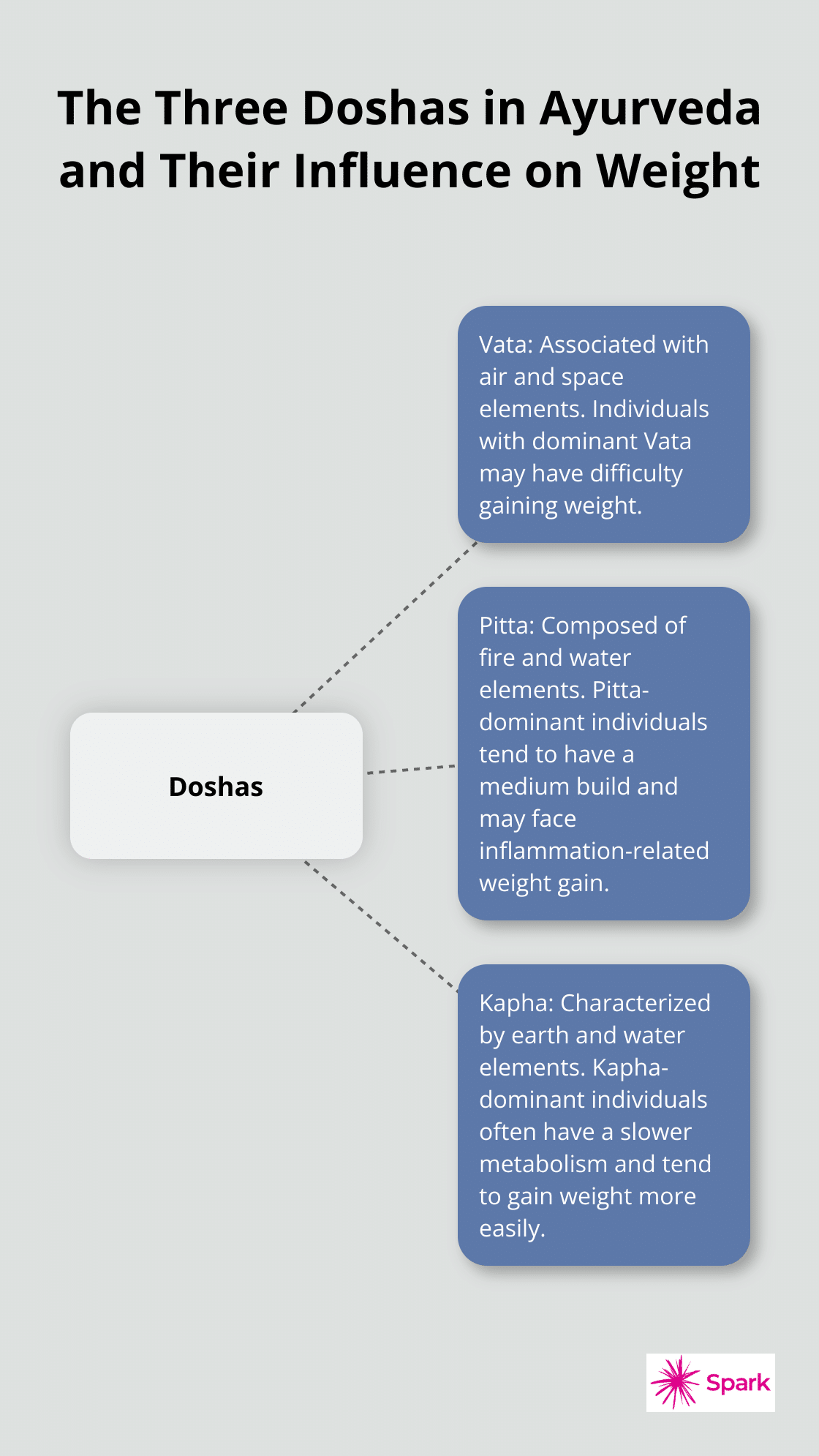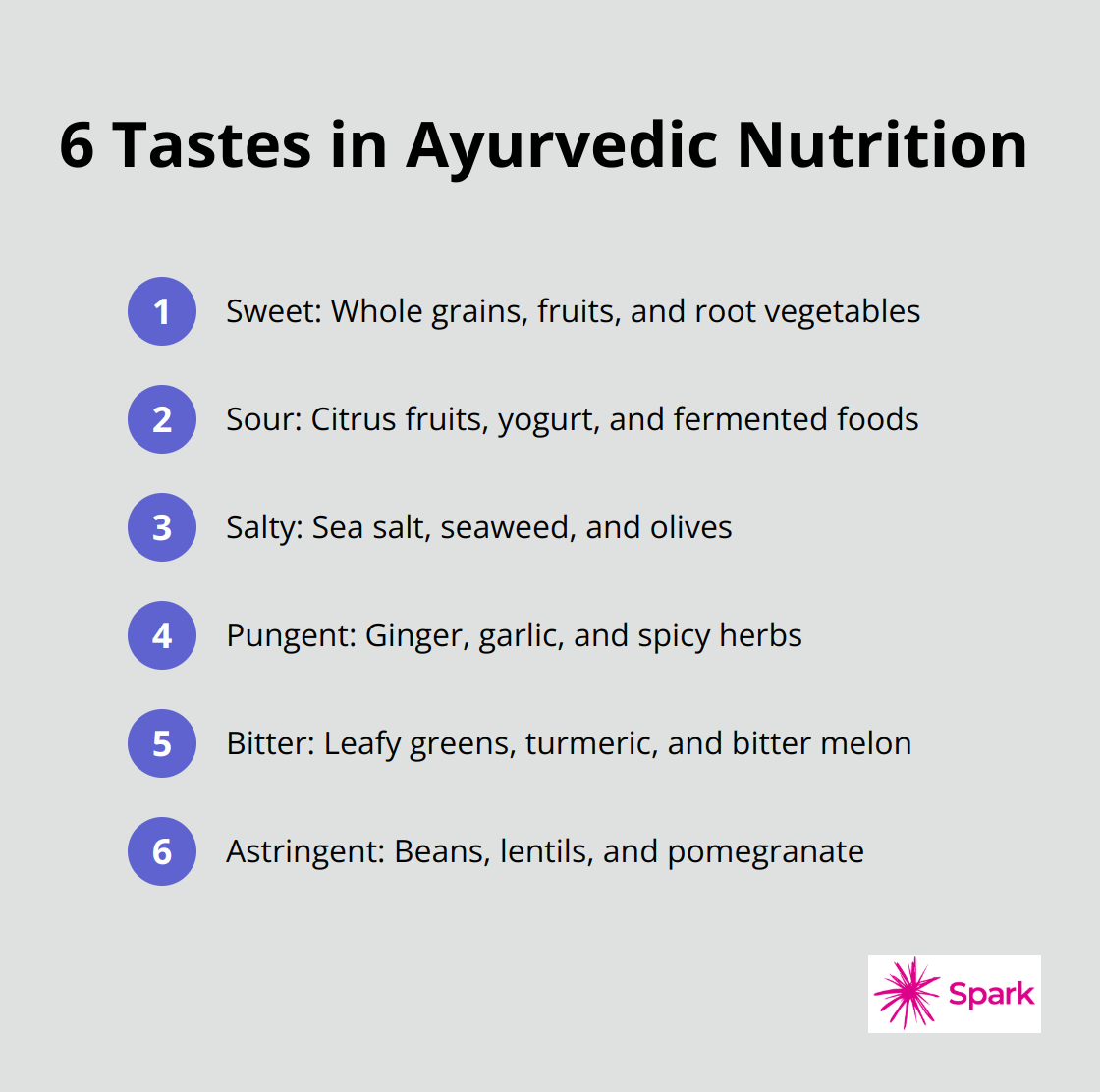At Spark Healthcare, we understand the growing interest in natural approaches to weight management. Ayurveda, an ancient Indian system of medicine, offers a holistic perspective on weight reduction that goes beyond simple calorie counting.
This blog post explores effective Ayurvedic methods for weight loss, focusing on personalized strategies based on your unique body type and lifestyle. We’ll share practical tips and insights to help you achieve sustainable weight reduction through Ayurvedic principles, diet, and lifestyle practices.
How Ayurvedic Principles Support Weight Loss
Understanding the Three Doshas
Ayurveda recognizes three main doshas: Vata, Pitta, and Kapha. According to Ayurveda, an imbalanced dosha leads to poor health and disease. Each dosha influences body weight differently. Kapha dosha, characterized by earth and water elements, has the strongest association with weight gain. Individuals with a dominant Kapha dosha often face challenges with slow metabolism and easier weight gain.

Effective weight management requires balancing all three doshas, with a particular emphasis on pacifying Kapha. This approach involves adopting a diet and lifestyle that counteracts Kapha’s heavy and cold qualities with light, warm, and stimulating elements.
The Importance of Agni in Weight Management
Agni, or digestive fire, plays a vital role in weight management according to Ayurvedic principles. It is essential for digestion, metabolism, immunity, and mental clarity.
To strengthen your agni, try these methods:
- Eat your main meal at midday when digestive fire is strongest
- Avoid ice-cold drinks, especially with meals
- Include spices like ginger, black pepper, and cumin in your diet
Tailoring Your Approach to Your Body Type
Identifying your dominant dosha is the first step in creating an effective Ayurvedic weight loss plan. While professional consultation provides the most accurate assessment, you can get a general idea by observing your physical characteristics and tendencies.
For example, if you tend to gain weight easily and have a slower metabolism, you likely have a Kapha-dominant constitution. In this case, focus on:
- Incorporating more pungent, bitter, and astringent tastes in your diet
- Engaging in regular, vigorous exercise
- Avoiding heavy, oily foods and excessive sleep
On the other hand, if you have a Pitta-dominant constitution, you might struggle with inflammation-related weight gain. In this case, emphasize cooling, sweet, and bitter foods while avoiding excessive heat and spice.
Personalized Strategies for Weight Loss
Ayurveda offers a unique approach to weight management that goes beyond simple calorie counting. At its core, Ayurveda recognizes that each person has a distinct body composition (their dosha). This understanding forms the foundation for personalized weight loss strategies.
To create a sustainable, personalized approach to weight loss, apply these Ayurvedic principles to your unique body type. This method addresses the root causes of weight gain rather than just the symptoms.
As we move forward, we’ll explore specific Ayurvedic dietary recommendations and lifestyle practices that can support your weight loss journey. These practical tips will help you implement Ayurvedic principles in your daily life for optimal results.
What Should You Eat for Ayurvedic Weight Loss?
Embrace Seasonal and Local Foods
Eating seasonally forms a cornerstone of Ayurvedic nutrition. Foods in season have the highest nutritional value and are most compatible with your body’s needs at that time. In summer, choose cooling foods like cucumbers and watermelons. In winter, opt for warming foods like root vegetables and hearty soups.
The Six Tastes for Balanced Nutrition
Ayurveda recognizes six tastes: sweet, sour, salty, pungent, bitter, and astringent. Including all six tastes in your meals ensures you get a wide range of nutrients and helps prevent cravings. Here’s a practical way to incorporate the six tastes:

A balanced meal might include a serving of quinoa (sweet), a side of sautéed kale (bitter) with garlic (pungent), lentil soup (astringent), and a small yogurt (sour) with a pinch of salt.
Mindful Eating and Food Combining
Ayurveda emphasizes the importance of how you eat, not just what you eat. Practicing mindful eating can lead to better digestion and satisfaction from your meals.
To eat mindfully:
- Sit down to eat without distractions
- Chew your food thoroughly
- Pay attention to the flavors and textures of your food
- Stop eating when you feel about 75% full
Proper food combining is another Ayurvedic principle that can support weight loss. Some key guidelines include:
- Avoid mixing proteins and starches in the same meal
- Eat fruits alone or 30 minutes before other foods
- Don’t combine dairy with sour fruits or fish
Herbal Support for Weight Management
Certain Ayurvedic herbs and teas can boost metabolism and support weight loss efforts. Triphala for weight loss has shown promising results. Studies have found that participants who took Triphala daily experienced significant reductions in body weight, body mass index, and waist circumference.
Other beneficial herbs include:
- Guggul: Supports thyroid function and fat metabolism
- Gymnema: Helps reduce sugar cravings
- Ginger: Boosts metabolism and aids digestion
Try incorporating these herbs into your daily routine, either as supplements or teas, to complement your dietary efforts. However, always consult with a healthcare professional before starting any new supplement regimen.
These Ayurvedic dietary principles create a sustainable and enjoyable approach to weight loss. The goal extends beyond just losing weight; it’s about achieving overall health and balance. In the next section, we’ll explore how Ayurvedic lifestyle practices can further enhance your weight loss journey and overall well-being.
How Ayurvedic Lifestyle Practices Aid Weight Loss
Establishing a Daily Routine
A consistent daily routine (dinacharya) supports optimal health and weight management. It regulates your body’s natural rhythms, improves digestion, and reduces stress.
Start your day at 6 AM. Drink a glass of warm water with lemon to stimulate digestion and cleanse your system. Follow with gentle stretching or yoga to awaken your body.
Eat meals at consistent times daily. Make lunch your largest meal when digestive fire peaks (typically between 12-2 PM). Avoid late-night eating; have your last meal at least 3 hours before bedtime.
Prioritizing Sleep and Stress Management
Quality sleep is vital for weight management. According to Ayurvedic texts, sleep is caused by increased kapha and insomnia by increased vata or pitta, which may follow physical or mental exertion. Sleep disruption affects hormones that regulate hunger and fullness, potentially leading to weight gain. Try to sleep 7-9 hours nightly, going to bed by 10 PM and waking up before 6 AM to align with natural circadian rhythms.
Create a calming bedtime routine. Read a book, practice gentle yoga, or do deep breathing exercises. Avoid screens for at least an hour before bed, as blue light can interfere with your sleep cycle.
Stress management is equally important. Chronic stress can cause hormonal imbalances that promote weight gain, particularly around the midsection. Include stress-reducing activities in your daily routine, such as meditation, pranayama (breathing exercises), or time in nature.
Ayurvedic Detoxification Practices
Ayurveda emphasizes regular detoxification to remove ama (toxins) from the body, which can contribute to weight gain and other health issues. Traditional Ayurvedic detox involves herbs, supplements, purges, enemas, bloodletting, and a dietary regimen, as well as stress-relieving lifestyle practices. While full panchakarma requires professional supervision, you can incorporate some gentle detoxification practices at home.
Dry brush before your morning shower to stimulate lymphatic drainage and improve circulation. Use a tongue scraper daily to remove toxins that accumulate on the tongue overnight.
Sip warm water throughout the day to flush toxins from your system. Try an Ayurvedic detox tea made with cumin, coriander, and fennel seeds (which supports digestion and gentle cleansing).
Yoga and Meditation for Weight Loss
Yoga and meditation are powerful tools for weight management in Ayurveda. They reduce stress, improve body awareness, and promote mindful eating habits.
Practice yoga for at least 30 minutes daily. Focus on poses that stimulate digestion and metabolism, such as twists and sun salutations. Incorporate breathing exercises (pranayama) to oxygenate your body and reduce stress.
Meditate for 10-15 minutes each day. This practice can help reduce emotional eating and improve your relationship with food. Start with guided meditations if you’re new to the practice.
Ayurvedic Self-Massage (Abhyanga)
Self-massage with warm oil (abhyanga) is a traditional Ayurvedic practice that supports weight loss. This ayurvedic self-care approach involves gently massaging the joints, muscles, and other body parts to stimulate blood flow and boost overall health.
Perform abhyanga before your morning shower. Use warm sesame oil (or an oil appropriate for your dosha) and massage your entire body for 10-15 minutes. Pay special attention to areas where you tend to hold excess weight.

Final Thoughts
Ayurveda provides a holistic approach to weight reduction that transcends simple calorie counting. This ancient system emphasizes the balance of doshas, particularly Kapha, through dietary changes and lifestyle practices. Weight reduction in Ayurveda focuses on embracing seasonal foods, incorporating six tastes in meals, and practicing mindful eating.
Ayurvedic detoxification practices and self-massage techniques enhance the body’s natural ability to shed excess weight. These strategies cultivate a balanced relationship with your body and mind, not just weight loss. Every individual is unique, so what works for one person may not work for another.
At Spark Healthcare, we recognize the connection between physical and mental well-being. Our telepsychiatry services offer personalized care for conditions like anxiety, depression, and ADHD (from the comfort of your home). We invite you to explore Ayurvedic principles for weight loss and discover the transformative power of this ancient wisdom in achieving your modern health goals.






